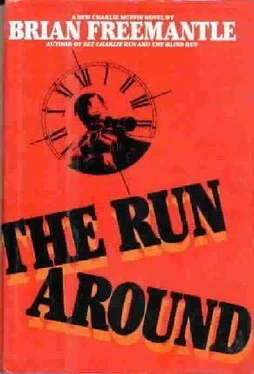Brian Freemantle - The Run Around
Здесь есть возможность читать онлайн «Brian Freemantle - The Run Around» весь текст электронной книги совершенно бесплатно (целиком полную версию без сокращений). В некоторых случаях можно слушать аудио, скачать через торрент в формате fb2 и присутствует краткое содержание. Жанр: Шпионский детектив, на английском языке. Описание произведения, (предисловие) а так же отзывы посетителей доступны на портале библиотеки ЛибКат.
- Название:The Run Around
- Автор:
- Жанр:
- Год:неизвестен
- ISBN:нет данных
- Рейтинг книги:3 / 5. Голосов: 1
-
Избранное:Добавить в избранное
- Отзывы:
-
Ваша оценка:
- 60
- 1
- 2
- 3
- 4
- 5
The Run Around: краткое содержание, описание и аннотация
Предлагаем к чтению аннотацию, описание, краткое содержание или предисловие (зависит от того, что написал сам автор книги «The Run Around»). Если вы не нашли необходимую информацию о книге — напишите в комментариях, мы постараемся отыскать её.
The Run Around — читать онлайн бесплатно полную книгу (весь текст) целиком
Ниже представлен текст книги, разбитый по страницам. Система сохранения места последней прочитанной страницы, позволяет с удобством читать онлайн бесплатно книгу «The Run Around», без необходимости каждый раз заново искать на чём Вы остановились. Поставьте закладку, и сможете в любой момент перейти на страницу, на которой закончили чтение.
Интервал:
Закладка:
To the guards Berenkov said: ‘Leave him.’
The men looked to Slepov, who nodded.
‘I want to conduct the interrogation alone,’ Berenkov said, to the commandant.
‘Regulations insist-’ began the man but Bereknov cut him off.
‘Alone,’ he said again.
Sampson remained quite still in the middle of the room, as if he were unaware of the conversation around him.
Berenkov settled behind the commandant’s desk, wanting the indication of its authority. He said: ‘You are serving a sentence of thirty years?’
‘Yes, sir.’
‘Do you expect the British to attempt an exchange?’
‘I do not know, sir.’
‘But you hope for one?’
Sampson hesitated, unsure how to reply, worried about offence. Eventually he said: ‘Yes, sir.’
‘After your arrest, in Moscow, you were taken to the Serbsky Psychiatric Hospital?’
Sampson visibly shuddered. ‘Yes, sir.’
‘Where you were treated with drugs?’ Aminazin to induce shock, Berenkov remembered, from the man’s file. Sulfazin, too, which caused a feverish rise of temperature, further to disorientate.
There was another shudder from the Englishman. ‘Yes, sir.’
‘Listen to me very carefully,’ said Berenkov. ‘I want you to comprehend completely what I say. I am going to ask you some questions and you must reply honestly to them. If you do not reply honestly, I shall ensure that any exchange approach by the British is permanently blocked: that you remain here for thirty years. I shall further have you taken to Moscow, to be treated again at Serbsky, until I believe the answers you are giving. Do you understand?’
The yellowed face glistened with the perspiration of fear and the manacled hands began to tremble. Sampson said: ‘Yes, sir. I understand, sir.’
‘You supplied disinformation to Moscow from a position in British intelligence while you were stationed in Beirut and Washington and attached to European Planning in NATO?’ said Berenkov. This was all in the file too, evidence from the man’s Moscow trial, after his confession, but Berenkov wanted to confirm everything.
‘Yes, sir.’
‘To trick the KGB into believing you were a genuine and valuable spy?’
‘Yes, sir.’
‘Your supposed trial and imprisonment in Wormwood Scrubs was a trick, too, wasn’t it?’
‘Yes, sir.’
‘For what purpose?’
Sampson moistened his lips, nervous at having to go beyond the brief, obedient replies. He said: ‘Further to make the KGB believe I was genuine.’
‘Did you expect them to rescue you from jail?’
‘Yes, sir.’
‘And then what?’
‘I was to try to infiltrate the KGB.’ The man spoke prison-fashion, his wetted lips hardly moving.
‘To act as a spy for the British?’
‘Yes.’
There had been no deviation from anything that had emerged at the trial but Berenkov had not expected it at this stage: the questioning so far had been to lull the other man as much as he could be lulled into the false security of safe answers. From now on the questions and those answers had to be different. ‘Tell me about Charlie Muffin,’ he demanded, curtly.
Sampson swallowed, his throat visibly moving. ‘I was put in a cell with him, in England. He was serving a sentence for deceiving the CIA, as well as the British. Both directors into KGB capture.’
Still trial deposition, thought Berenkov. And supported by their own records. Which had to be wrong. Would both services have abandoned their directors for some infiltration scheme? He found it difficult — practically impossible — to conceive yet it had to be, if Charlie Muffin were back in British intelligence, which he provably was. It was the moment to remind the man of penalties. Bere-nkov said: ‘Remember what I said about an exchange? And Serbsky.’
‘Yes, sir.’
‘Charlie Muffin’s imprisonment was a trick, too, wasn’t it? Part of the same plot to infiltrate both of you into the KGB?’
Sampson’s distress this time was greater than at any time before: the sweat leaked from him, staining through the canvas and shining his face and he clutched one metal-strapped hand over the other, in an effort to control the shaking. He said: ‘That was the prosecutor’s demand, at the trial.’
‘I know,’ said Berenkov, hard-voiced. ‘And then you denied it. But that denial was a lie, wasn’t it!’
‘No!’
The prisoner had twice forgotten the respectful ‘sir’, which he well knew to be a punishable offence, recognized Berenkov. He said: ‘So tell me about Charlie Muffin.’
‘He wasn’t part of anything; couldn’t be. He had to believe I was a traitor, to build up my credibility when I got to Moscow. And he did believe it: I think he hated me.’
‘Why did he hate you?’
‘Because he did not regard himself as a traitor, although that was what he’d been sentenced for being; he always said he trapped the two directors for their trying to trap him. That it was personal.’
The sweat was making black marks on the prison uniform and the respectful address seemed completely forgotten. Berenkov said: ‘Why did he come with you to Moscow, then?’
The pause this time was different than any before. Throat pumping, Sampson said: ‘Because imprisonment was destroying him.’
You poor bastard, thought Berenkov. It was an easy reflection, from his own experiences, despite everything the Englishman had done or tried to do. He said: ‘You remember being separated from him, soon after you got to Moscow?’
‘Yes,’ said Sampson. Then, remembering, he added hurriedly: ‘Sir.’
‘Do you know what happened to him?’
‘From the questioning at my trial I assumed he had been arrested, too, sir.’
‘He wasn’t,’ disclosed Berenkov. ‘He escaped back to England with the help of the British embassy.’
It was not a question and Sampson was too well indoctrinated to respond. Berenkov let the full awareness settle with the other man and then continued: ‘And he’s back in your intelligence service. Operating as an agent.’
For several moments there was no response, because Sampson was fighting against any reaction that might get him into trouble, but in the end he failed. His head went back and the word came out in a wail: ‘No!’
‘Yes,’ insisted Berenkov.
For the first time since the interrogation began Sampson directly fixed the Russian with those hollow eyes. ‘Why!’ he said, wailing still. ‘How!’
Sampson genuinely knew nothing, Berenkov decided. No man who had undergone the psychiatric interrogation of Serbsky and endured imprisonment here at Potma — and been threatened with a continuation of both — would have risked lying. Who had lied then? There was only the woman, Natalia Nikandrova Fedova. Yet she had been the KGB debriefer who exposed Sampson as the spy he later admitted to being under that first interrogation. Nothing reconciled, to make any sense. Unless … No, that did not make any sense, either. He said: ‘So you were tricked, too?’
‘But why!’
Something else that did not make sense, thought Berenkov. Honestly he said: ‘I don’t know.’
‘Sir?’
It was unthinkable for a prisoner to make any sort of demand unless he were on the point of complete breakdown. ‘What?’ said Berenkov.
‘I have told the truth.’
‘I believe you have.’
‘Please, sir, don’t submit me again to the Serbsky!’
‘I won’t,’ said Berenkov.
‘No punishment: please, sir, no more punishment!’
‘No,’ promised Berenkov. ‘No more punishment.’
Later, during the final moments of Berenkov’s anxious departure from the camp, Slepov said: ‘About the prisoner? Is he to be subjected to any special sort of regime?’
Читать дальшеИнтервал:
Закладка:
Похожие книги на «The Run Around»
Представляем Вашему вниманию похожие книги на «The Run Around» списком для выбора. Мы отобрали схожую по названию и смыслу литературу в надежде предоставить читателям больше вариантов отыскать новые, интересные, ещё непрочитанные произведения.
Обсуждение, отзывы о книге «The Run Around» и просто собственные мнения читателей. Оставьте ваши комментарии, напишите, что Вы думаете о произведении, его смысле или главных героях. Укажите что конкретно понравилось, а что нет, и почему Вы так считаете.












